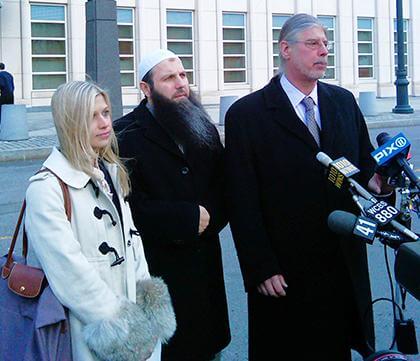By Connor Adams Sheets
Flushing imam Ahmad Wais Afzali pleaded guilty in a Brooklyn court last Thursday to lying to federal authorities who were investigating a terror plot involving a member of his Queens mosque.
He was initially charged after his arrest in September 2009 with lying to authorities in the course of a terror investigation after informing Najibullah Zazi, the admitted ringleader of a plot to carry out a series of coordinated suicide bombings on New York City subways, that he was under investigation.
The government agreed to drop the terror aspect as part of his plea agreement and in light of details that have surfaced in recent months.
The imam, who worked for the past several years as a liaison between the New York Police Department and the Queens Muslim and Afghani communities, now faces five years in prison. But sentencing guidelines suggest Judge Frederic Block in Brooklyn federal court could sentence him to zero to six months behind bars, a recommendation prosecutors agreed not to question.
In a tearful statement in court Afzali, 39, apologized for his actions, saying he loves the country he moved to from Afghanistan when he was 9.
But in making his plea, Afzali, a legal permanent resident of the United States but not a citizen, agreed to leave the country within 90 days of his release from any prison term or be deported, a fact that left him distraught after the hearing since his wife, two children and other family members are American citizens.
“I just signed my death sentence because of my health. I’m a diabetic and an anemic,” he said. “My wife has a pelvic tumor, my father is sick. … I’m up between a rock and a wall here. Here I am, helping the government, that’s what I get.”
Afzali, who lives in Fresh Meadows, also said at a news conference in front of the court he is worried that if he returns to Afghanistan his life will be in danger because of his cooperation with U.S. authorities.
Afzali said he has known Zazi, 25, and another suspect in the terror plot, Adis Medunjanin, 25, since they were teenagers who frequented his mosque to play volleyball and pray. On Sept. 10, 2009, police asked Afzali to provide information about the two men, and he agreed to do so, according to his allocution.
On Sept. 11, he called Zazi and told him that law enforcement had been in contact about him and that their telephone conversation was being monitored, Afzali said. He said he also told him “not to get involved in Afghanistan garbage and Iraq garbage.” On Sept. 13, he was interrogated by FBI agents, whom he believed were angry at him for calling Zazi, and he lied and said he had not done so. He repeated the lie Sept. 18 at the U.S. attorney’s office in Brooklyn, he admitted.
But Ron Kuby, Afzali’s lawyer, said Afzali’s actions were carried out “with the best intentions” and that developments since September revealed that his call was not the reason why Zazi called off the plot and destroyed the explosives and other items he intended to use in its execution.
Zazi instead determined he was likely under investigation when Port Authority police stopped him in a “phony drug stop” on the George Washington Bridge, Kuby said.
“Rather than tipping off Zazi that the FBI was investigating him, what he really did was tip the FBI off that Zazi knew he was under investigation,” Kuby said. “In a strange way, he actually assisted the investigation.”
Afzali will be sentenced April 8 at 4 p.m. at federal court in Brooklyn.
Reach reporter Connor Adams Sheets by e-mail at csheets@cnglocal.com or by phone at 718-260-4538.



































